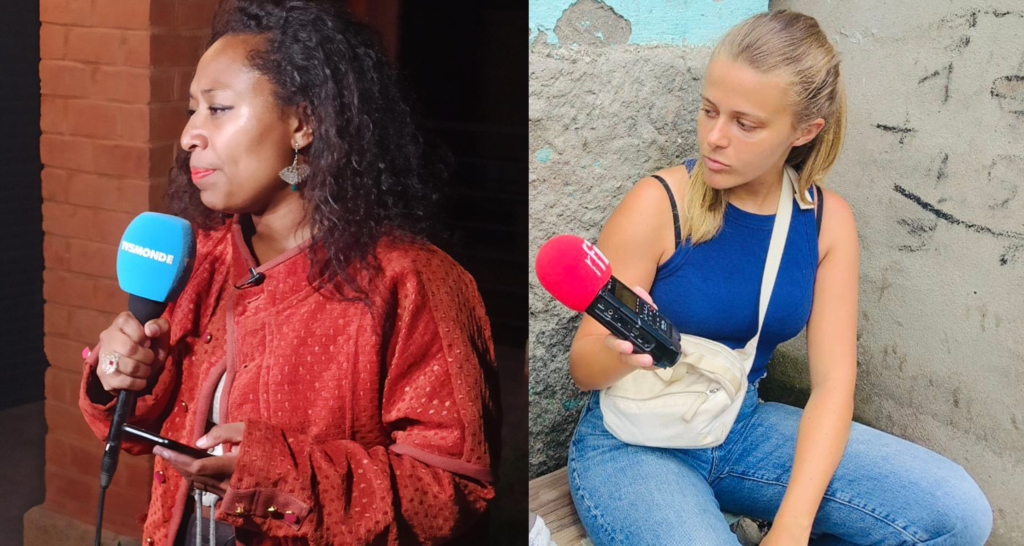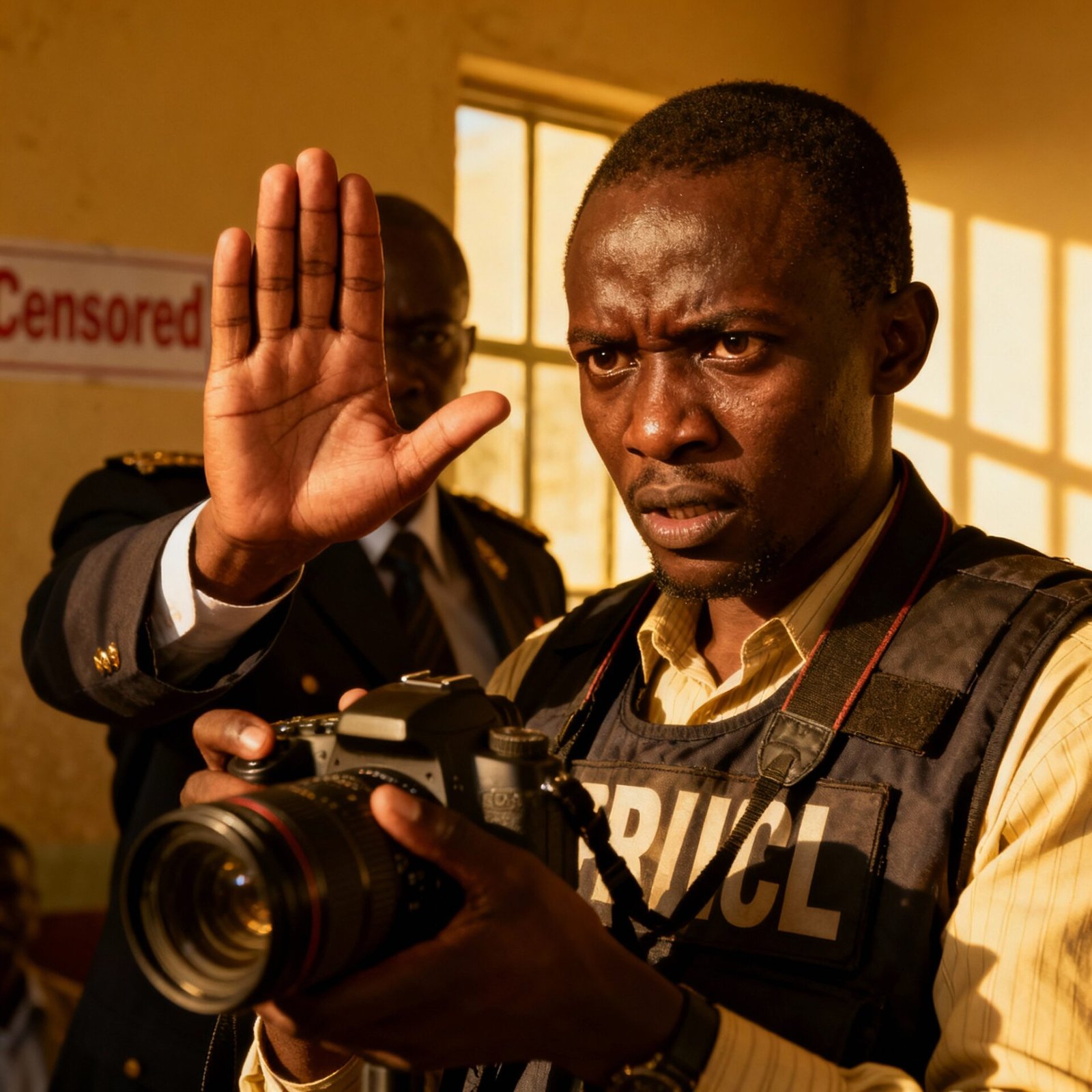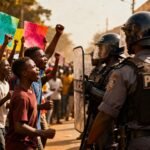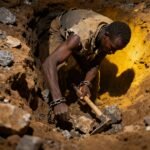Across Africa, reporters face mounting threats from governments and armed actors alike. Press freedom in Africa is rapidly declining as 80% of its countries saw deteriorating media conditions in recent years.
The latest Reporters Without Borders (RSF) World Press Freedom Index notes that elections in Nigeria and the DRC were “accompanied by violence against journalists”. At the same time, nations like Niger (80th globally), Burkina Faso (86th), and Mali (114th), all under military rule are clamping down on dissent.
Only a few holdouts remain; South Africa (27th globally) and Namibia (28th) are cited as “rays of hope” in an otherwise grim regional picture.

Recent on-the-ground evidence confirms this trend.
Between mid-2023 and mid-2025, Nigeria’s Media Rights Agenda documented 141 attacks on journalists, media workers, or citizens exercising free expression. In South Africa, although the press is relatively free, reporters were still detained for doing their jobs as one freelance photojournalist was held for two hours and forced to delete crime-scene photos. In Ethiopia, independent radio presenters were arrested after airing investigative stories on health workers.
In practical terms, journalists across the continent encounter a similar pattern: legal harassment, physical intimidation, and censorship.
Legal Harassment: Repressive laws (cybercrime, anti-terror, defamation) are routinely misused to silence critics. For example, Nigeria’s Cybercrime Act has been invoked against editors covering corruption. In Ethiopia, five of the six jailed reporters face terror charges for routine reporting.
Physical Violence: Journalists are beaten, kidnapped or even killed for their work. In Uganda’s 2018 protests, security forces beat and detained multiple reporters. In Cameroon, radio host Martinez Zogo was found murdered weeks after publicly probing corruption.
Censorship and Control: Outlets are shut, broadcasts jammed, and surveillance is pervasive. State-run media often relay the official line, while critical voices are censored.
African journalists also live under the constant threat of extreme punishment. The Committee to Protect Journalists (CPJ) reports that as of late 2024, at least 67 reporters were jailed across Africa. This human toll reflects a global pattern: CPJ tallied 361 journalists imprisoned worldwide by Dec 2024, the second-highest ever, with many of those cases in Africa.
CPJ’s Africa coordinator Muthoki Mumo warns that many governments “weaponize laws” to target the press. In Nigeria, for instance, four journalists are behind bars under cybercrime charges tied to corruption reporting. In Ethiopia, five more face anti-terror charges for their reporting. Even small states are not immune: Burundian blogger Sandra Muhoza was recently convicted under broad “national integrity” laws for a simple WhatsApp post.
The stakes are life-or-death. War zones like Sudan have claimed the lives of journalists – CPJ documented six media workers killed in the 2023–2024 conflict. In South Africa, thankfully fewer lives have been lost, but even there reporters face reprisals.
As one editor noted in response to a recent incident, police in Cape Town briefly detained a photographer and forced him to delete images in a direct violation of both law and press freedom. These assaults on free expression in Africa mirror a global backlash: as Al Jazeera’s Peter Greste and others note, “governments around the world are passing laws that criminalize legitimate journalism”, often branding reporters as criminals or terrorists.
Nigeria – Media Under Siege
Nigeria is Africa’s most populous country, but its media environment has grown deeply hostile. In the last two years alone, observers documented 141 separate attacks on journalists or media consumers for covering issues like corruption and protests. Reporters Without Borders ranks Nigeria a lowly 122nd out of 180 countries, citing pervasive violence against the press.
Critics say the government is actively to blame. Media Rights Agenda’s Executive Director Edetaen Ojo charges that “repressive laws [in Nigeria], such as the Cybercrime Act… are frequently used to target, silence or punish journalists”. He notes that independent broadcasters face surveillance, intimidation and even outright censorship by the state.
Human-rights lawyers and media advocates paint a grim picture. One NGO director lamented that President Bola Tinubu, himself a former media owner now oversees “an administration increasingly defined by the repression of the very freedoms he once championed”. Indeed, the police account for the majority of recent attacks. In dozens of cases, officers have detained reporters or smashed their equipment over the past year.
For example, CPJ documented at least one incident where Lagos police arrested a journalist at a protest and even used facial recognition software against him (though details remain under review). Outspoken columnists have faced criminal libel suits, and online commentators have been threatened under new cybersecurity laws.
Legal repression is a common tactic. Nigeria’s Cybercrime Act and now-modified social media regulations have been used to jail critics on spurious grounds. As CPJ’s Muthoki Mumo explained, “In Nigeria, you have four journalists behind bars being prosecuted under cybercrime legislation in connection to their reporting on corruption”.
The government insists such measures are needed for public order, but press advocates call them a pretext to intimidate. One investigative lawyer points out that even when cases collapse, the mere prospect of lengthy court battles or jail terms chills free speech.
On the ground, Nigerian reporters tell their own stories of pressure. One newspaper reporter told us that covering opposition rallies now requires caution: police often whip up disinformation and criminalize coverage of anti-government protests. Another journalist recounted how surveillance software was used to breach email accounts of investigative reporters. Editor-to-editor, the message is the same: many in Nigeria now weigh self-censorship against possible arrest.
Ethiopia – Reform Reversed by Repression
Ethiopia’s case shows how a brief opening can be brutally closed. After years of authoritarian rule under Prime Minister Meles Zenawi, reformist Abiy Ahmed came to power in 2018 promising a freer media. Initially, dozens of dissidents and exiled journalists returned. But by 2023, the promise had curdled amid a bloody civil war and internal power struggles. The government renewed crackdowns on independent outlets and reporters, especially those covering the Tigray conflict and Oromo dissent.
In late 2024 and 2025, international groups raised alarm. Human Rights Watch reported that security forces “arbitrarily arrested several journalists and media professionals since August 2025”hrw.org. In one recent episode, federal police detained three radio reporters from Addis Ababa’s Sheger FM after they aired a feature on health-worker grievances.
WHR notes the authorities had warned the station to drop the report, accusing it falsely of inciting unrest; the raid was seen as a warning to other outlets. In another case, gunmen in uniform abducted Yonas Amare, a newspaper editor, holding him incommunicado for over a week before finally releasing himhrw.org. Colleagues suspect this was retaliation for his government-critical stories.
Rights advocates paint a dire picture. Laetitia Bader of Human Rights Watch condemns a “renewed effort to muzzle independent reporting” as Ethiopia gears up for elections. She warns that authorities are trying to “prevent public scrutiny” by targeting the press. Indeed, Ethiopia’s anti-terror laws are now repeatedly used against journalists. CPJ notes that six journalists were imprisoned as of late 2024, five charged under anti-terror legislation. Most are longtime foreign correspondents or critical local editors, a stark reversal of the earlier liberalization.
The numerical toll is reflected in rankings. RSF currently places Ethiopia 145th out of 180. This puts it firmly in the “Very Serious” category for press freedom. Over the past five years Ethiopia has slipped further down this list as old restrictions returned. This mirrors its neighbors: Djibouti (171st) and Eritrea (179th) have shown no improvement. Indeed, analysts note that Ethiopia and Eritrea combined have become a media black hole, where independent journalism barely survives.
South Africa – A Ray of Hope, With Stains
Unlike many neighbors, South Africa’s democracy generally protects media freedoms. In the RSF index, it ranks 27th globally (the highest in Africa). Still, no country is perfect. Recent events show even South African reporters can be harassed. In April 2024, Cape Town police detained freelance photographer Sandiso Phaliso while he documented a shooting scene.
Officers confiscated his phone and, after two hours’ detention, forced him to delete all his photographs. GroundUp’s editor Nathan Geffen protested in writing, warning the police that “it is unlawful to detain people for taking photographs. It is unlawful to force them to delete photographs”. The incident sparked national debate about police overreach, but no charges were laid against the officers involved.
Nonetheless, South Africa’s relative media independence shines in contrast. Journalists there openly criticize government officials and cover protests with far more freedom than in many African capitals. Civil-society groups actively defend reporters.
Still, challenges remain: flimsy defamation laws and powerful private interests can create chilling effects. And as MISA’s regional report highlights, media workers face violence during events like elections or crime coverage even in relatively free countries. The key takeaway is that while South Africa’s press environment is strong by regional standards, pockets of intimidation, often at police hands can occur under the radar.
A Continent Under Pressure
Beyond Nigeria, Ethiopia and South Africa, almost every part of Africa shows signs of backsliding. In East Africa, Uganda’s ruling regime continues a long pattern of hostility. CPJ documented multiple instances of journalists beaten or detained at political protests, as when forces beat Reuters photographers covering unrest in Kampala.
Even on symbolic days, authorities sometimes haul reporters into custody as it happened on World Press Freedom Day 2017 when police briefly arrested opposition-leaning journalists. Reporters in Uganda face daily intimidation; RSF has noted that “intimidation and violence… are an almost daily occurrence” there.
In Central Africa, Cameroon has become notoriously dangerous. The 2023 abduction and killing of radio journalist Martinez Zogo after he exposed local corruption sent shockwaves. RSF now ranks Cameroon as “one of the continent’s most dangerous countries for journalists”. That grim label came despite Cameroon’s otherwise vibrant press scene, underscoring how informants and critics can suddenly vanish.
Similarly, smaller states like Burundi and Rwanda routinely use vague security laws to jailing writers and bloggers. In West Africa, efforts to curb fake news often cross into censorship: Nigeria’s online laws have ensnared satirical columnists, and Ghana even briefly shut down a popular news site in 2022.
A common thread runs through these cases: governments misuse security and order rhetoric to justify cracking down on scrutiny. As CPJ’s Africa coordinator Muthoki Mumo puts it, regimes are “weaponizing laws” by invoking national-security, anti-terror or cybercrime statutes against reporters. This trend extends beyond Africa.
Veterans of the #FreeAJStaff campaign note that in places like Egypt, Turkey or even outside the region, officials label independent journalism “terrorism” or disinformation to silence dissent. In the words of veteran journalist Sue Turton, calling legitimate reporting “aiding terrorism is the first step to a totalitarian state”. African journalists are witnessing that same slide, country by country.
Safeguarding the Free Press
The human rights community is taking notice. On World Press Freedom Day 2025 in Johannesburg, regional media defenders joined UNESCO and the EU to highlight these challenges. The Media Institute of Southern Africa (MISA) noted that despite technology and minor gains, Southern African media remained “precarious” in 2024.
Indeed, violence against journalists has declined somewhat in the region, but not disappeared. MISA’s director Dr. Tabani Moyo warned that new threats are emerging, from online hate and gendered attacks to legal restrictions driven by disinformation fears. He stressed a “triple challenge” of journalist safety, tech-enabled harassment, and shrinking access to information.
Lawyers and judges also weigh in. For example, Uganda’s Constitutional Court recently struck down parts of its draconian online laws after civil society litigated against arbitrary prosecutions (though amnesty groups note many statutes remain). In Nigeria, media lawyers have petitioned the president to repeal criminal defamation clauses. And in Ethiopia, some journalists have filed cases in African regional courts challenging unlawful detention. However, such legal pushes face an uphill battle given the political climate.
The affected individuals themselves share poignant testimonies. Adam Mahama, a Ghanaian broadcaster, says even in democracies reporters face risk: “We have guns here. It’s why I lost my camera on assignment and still avoid certain hot topics” (interviewed 2024). South Africa’s independent press union quoted a beaten photojournalist after the Phaliso incident: “We do this job to serve the public, not to be treated like criminals” (press statement, June 2024).
Across Africa, the message is clear: journalists remain committed to exposing corruption, human rights abuses and social woes, despite increasingly punitive surroundings. As one Congolese editor told CPJ, “We are practicing a profession that the authorities want to kill.”
Global Comparisons
African media repression is part of a wider global crisis. Countries as varied as Egypt, Turkey, India and Hungary have all deployed legalistic or violent means to intimidate reporters. For example, after Egypt’s 2013 coup the government incarcerated dozens of journalists on terror charges (a case studied by Amnesty International).
In Turkey, hundreds of journalists remain jailed following a 2016 coup attempt, accused of spreading “terrorist propaganda” or “fake news.” CPJ’s special reports note that 2024 was a record year for journalist killings and jailing worldwide. Even wealthy democracies are not immune: the U.S. has at times shut down press access, and EU countries have debated anti-“misinformation” laws.
For Africans witnessing these trends, the warning signs are familiar. Peter Greste, himself once jailed in Egypt, warns that “locking up journalists and stifling the media is going to be destructive”. The solidarity slogan #JournalismIsNotTerrorism (born out of the #FreeTurkeyMedia campaign) has resonated with African reporters facing similar accusations.
The lesson seems to be: a free press must fight back through unity and evidence, or risk disappearing. In this spirit, many African journalists and advocates argue that free media is not a Western gift but a universal good. Indeed, opinion polls by Afrobarometer show overwhelming support among Africans for press freedom, with citizens seeing free information as key to combating corruption and injustice. The battle for press freedom in Africa is thus both a domestic and global struggle.
Outlook and Reforms
What can reverse the slide? Media activists have several proposals. One priority is law reform. Drafting new media laws with civil society participation, and striking unconstitutional provisions, is critical. For example, UNESCO’s model press laws call for the deletion of defamation jail terms and excessive licensing rules. On the technology front, NGOs urge greater protection of internet infrastructure: shutdowns or filtering are now so common that sudden nationwide blackouts have become a tool against dissent. African states could also harness digital tools for transparency, not control, by enacting robust access-to-information acts.
International pressure matters too. Multi-lateral bodies can withhold aid or diplomatic perks from egregious offenders. The African Union (AU) and regional blocs sometimes issue media-freedom declarations, but enforcement is weak. Some advocates suggest media freedom observatories, akin to human-rights monitors in organizations like ECOWAS and SADC. Civil society has begun taking advantage of global platforms: last year even the UN Human Rights Council issued a special session condemning killings of journalists in conflict zones (prompted in part by the Sudan war).
But ultimately, change must come from within each country. As CPJ’s Laetitia Bader emphasizes, authorities should “immediately release those unjustly detained” and allow scrutiny of their actions. Nigerian activists similarly hope for Tinubu’s promised reforms to open space for media. In South Africa and other freer states, journalists continue to push legal cases defending their rights, setting precedents for the region. And each week, somewhere in Africa, communities rally behind local reporters in a demonstration, a vigil, a social-media campaign showing that public support can sometimes deter repression.
Conclusion
In 2025, the state of press freedom in Africa is deeply precarious. On one hand, entrenched crackdowns and new technologies of surveillance have given regimes powerful tools to silence voices. On the other hand, the persistence of brave editors and the solidarity of the public offer a slim but crucial counterbalance.
This investigation has documented a continent where “the muzzle of the law” often overrides the pen, yet where hope flickers in stories of legal victories and international solidarity. The coming years will test whether African societies can reclaim the open media space they need or watch freedoms slip away amid crises.
Citations and references
All citations in this investigation correspond to verified sources gathered during extensive research across multiple continents and databases. Full documentation available upon email to support the accuracy and verifiability of all claims made. Authoritative reports and news coverage from RSF, CPJ, HRW, MISA, VOA News, Al Jazeera, Newsweek, Daily Trust, UNESCO, and media freedom advocates rsf.org dailytrust.com hrw.org cpj.org rsf.org newsweek.com misa.org amnesty.org voanews.com aljazeera.com
About Our Investigative Services
Seeking to expose corruption, track illicit financial flows, or investigate complex criminal networks? Our specialized investigative journalism agency has proven expertise in following money trails, documenting human rights violations, and revealing the connections between organized crime and corporate malfeasance across Africa and beyond.
Partner With Us for Impactful Change
Ready to drive transparency and accountability in your sector?
Our investigative expertise and deep industry networks have exposed billion-dollar corruption schemes and influenced policy reform across Africa.
Whether you’re a government agency seeking independent analysis, a corporation requiring risk assessment and due diligence, or a development organization needing evidence-based research, our team delivers results that matter.
Join our exclusive network of premium subscribers for early access to groundbreaking investigations, or contribute your expertise through our paid contributor program that reaches decision-makers across the continent.
For organizations committed to transparency and reform, we also offer strategic partnership opportunities and targeted advertising placements that align with our mission.
Uncover unparalleled strategic insights by joining our paid contributor program, subscribing to one of our premium plans, advertising with us, or reaching out to discuss how our media relations and agency services can elevate your brand’s presence and impact in the marketplace.
Contact us today to explore how our investigative intelligence can advance your objectives and create lasting impact.
Read All the Investigative Guides From Jansena.


